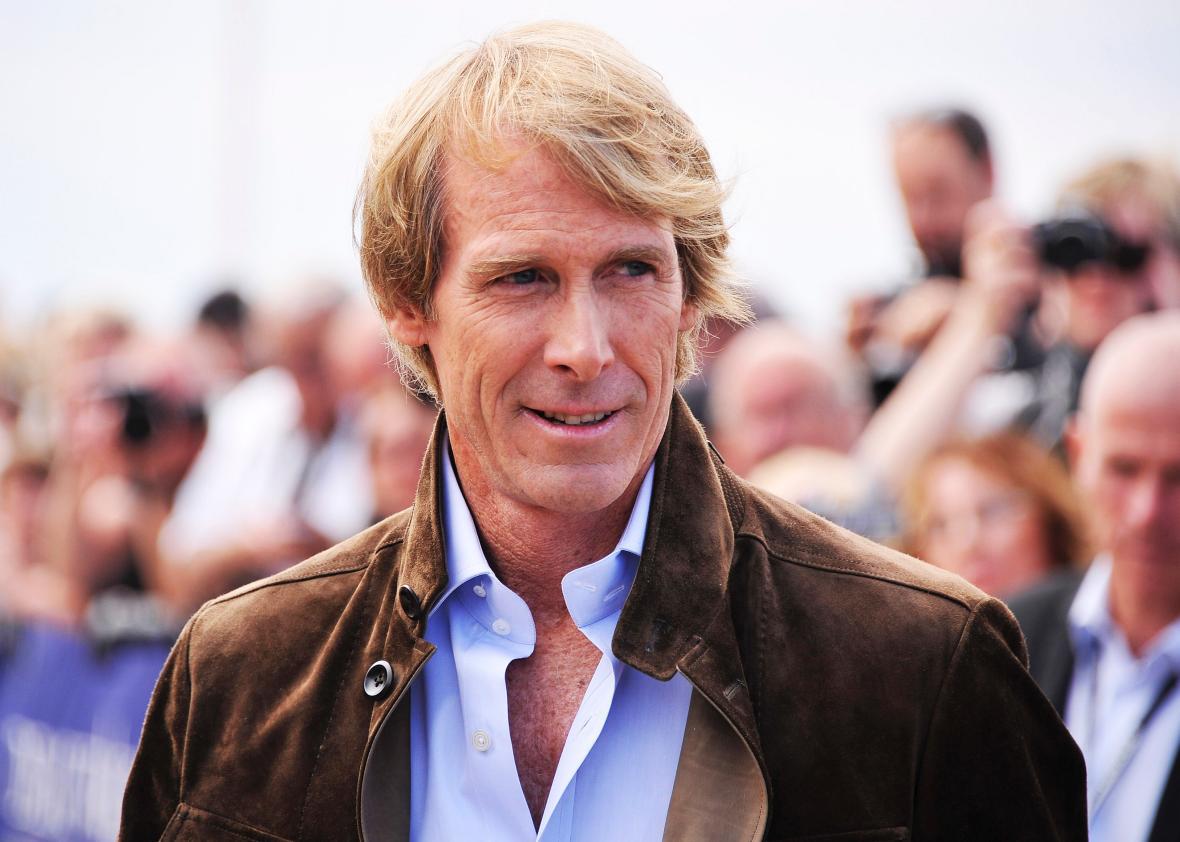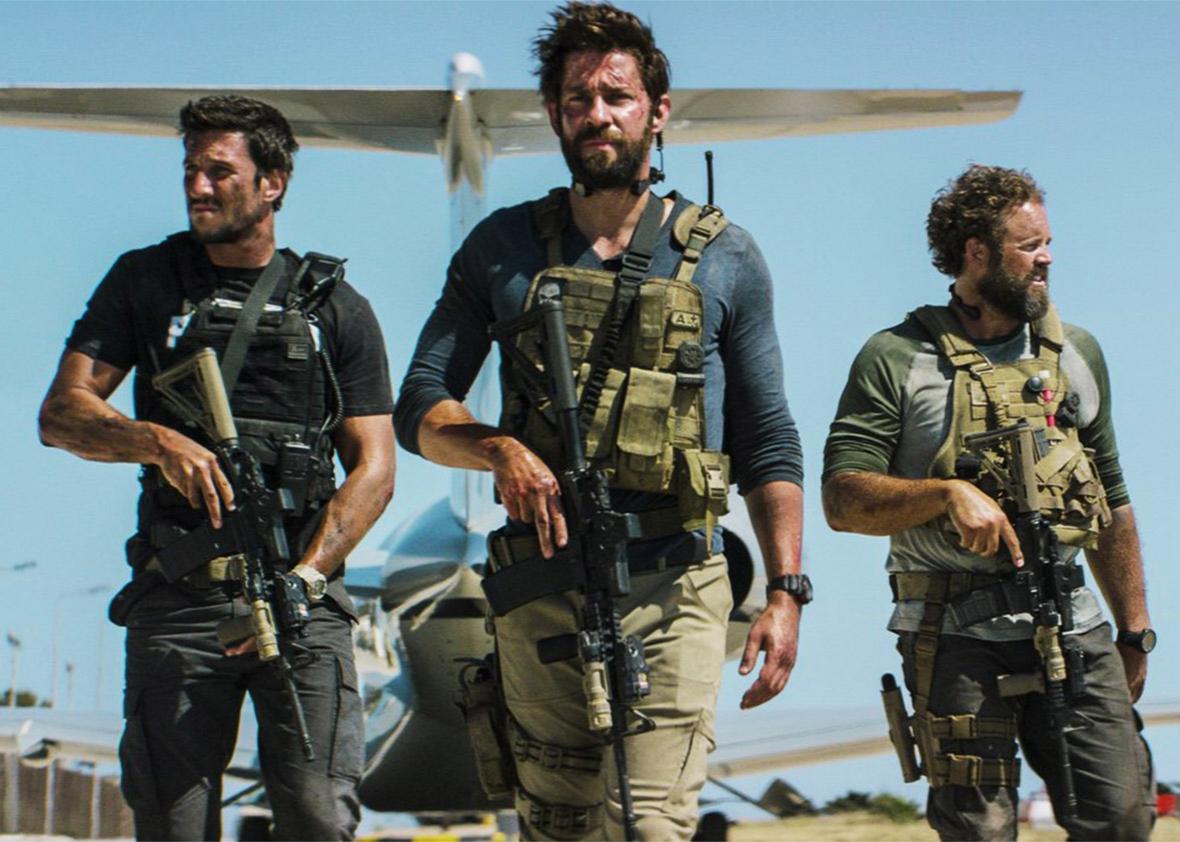The September 2012 attacks on the U.S. diplomatic compounds in Benghazi may have occurred less than four years ago, but 13 Hours: The Secret Soldiers of Benghazi is the movie that Michael Bay has been waiting his entire life to make. He wanted to direct Black Hawk Down, but Ridley Scott got there first. (Bay has begrudgingly approved of the movie that resulted.) He then wanted to direct Lone Survivor, but Peter Berg snatched it out from under him. And just when it seemed like we’d never again strand American personnel in a FUBAR situation on the soil of a distant country (pause for bitter laughter), Bay was finally able to acquire the rights to one of recent history’s most violent wrongs.
A military fetishist whose films share a profound concern for the seemingly one-sided relationship between the United States and its soldiers, Bay has always expressed more sympathy for the (muscular, monosyllabic) men who risk their lives for their country than he has for the peckerwood desk jockeys who give them their marching orders. Although he keeps his political persuasions private, Bay’s unashamed American exceptionalism—which persists even in an intergalactic fight with shape-shifting robot aliens—has made him seem like a bombastic conservative in an industry that’s dominated by outspoken liberals. Not for nothing, but we’re talking about a guy who once made a movie about a team of oil drillers literally saving our planet. That Bay has volunteered himself to direct Hollywood’s first—and likely only—Benghazi blockbuster might seem to confirm suspicions of his right-wing leanings. After all, no one with a vested interest in Hillary Clinton being the next president of the United States would make any film about the most controversial chapter of her political career, right? And now, not only do we have a popcorn epic about this extremely delicate international incident, but it’s directed by a guy whose most subtle movie stars Nicolas Cage.
And so imagine my surprise that, more than anything, 13 Hours almost feels … humanistic? Almost. Bay has stated that his intentions were simply to honor the heroism of the guys on the ground, and 13 Hours bears that out. The result, much to my surprise, is one of the most politically astute films about America’s foreign politics in years, purely on the strength of what it’s willing to ignore.
Which isn’t to say that Bay doesn’t have an eye on the big picture—13 Hours opens with a shot of the Earth as seen from space, because though Bay seems offended by the idea that these soldiers’ deaths have been turned into fuel for a perpetual flame war, he’s certainly not above bending historical tragedy to his personal aesthetic. (This is, after all, the same guy who made Pearl Harbor.) We then get a crash course in Libya’s recent history, from the fall of Moammar Gadhafi’s dictatorship to the militias that rose from the rubble and how the overconfident U.S. government closed the vast majority of outposts it had established in the country.
We fly into Benghazi with contractor Jack Silva (The Office star John Krasinski, who now has all the abs), a scruffy family man who can’t seem to stay away from the deadliest places on Earth. He’s the kind of hero who tries to call his wife during the middle of a firefight, but this the kind of movie that won’t give him enough time to get through to her.
Jack is met at the airport by a ride-or-die badass named Tyrone “Rone” Woods (the indefatigable James Badge Dale), who casually says things like “Payback’s a bitch, and her stripper name is karma.” (We never learn exactly how many Imagine Dragons concerts he’s been to, but I assume it’s a lot.) It’s soon clear that Rone, Jack, and the four other CIA security contractors based out of America’s secret Benghazi base are absolute geniuses in a war zone. In fact, these men exude such a remarkable aura of competence that you grow hyperattuned to the few hints of fear that peek through their façades and can almost imagine how the White House thought them capable of holding their own against any of Libya’s residual threats.

Photo by Francois Durand/Getty Images
The rest is (virulently controversial) history. U.S. Ambassador J. Christopher Stevens comes to town as part of his sincere campaign to win the hearts and minds of the Libyan people, local elements are tipped off to his arrival, and at approximately 9:40 p.m., more than 100 armed militants storm the poorly guarded compound at which Stevens has been lounging poolside. Jack, Rone, and the rest of their team watch the violence erupt from their hidden base a mile down the road, waiting (and waiting, and waiting) for permission to launch a rescue mission. The “stand down” order that kept them muzzled for too long is perhaps the rawest political nerve addressed in 13 Hours, which has been adapted from a Mitchell Zuckoff book of the same name, and pins the blame for that blunder on the soldiers’ sniveling commanding officer (David Costabile, who played Gale on Breaking Bad, and plays a similar patsy here).
When darkness falls over Benghazi and the CIA team finally does gets involved in the fray, Bay submerges the film into almost 90 minutes of carefully controlled chaos. The action is never topsy-turvy enough for 13 Hours to be mistaken for a Paul Greengrass film, but it’s also not so operatic that it feels like Bay is turning a tragedy into Bad Boys III. The most effective moments position us with Rone and Jack on the roof of the CIA compound, the clarity of their sightlines allowing us to share their perspective of the attack in progress. On the other hand, Bay can’t help himself from dipping into his arsenal of cinematic awesomeness, at one point even borrowing a trick that was gross back when he used it in Pearl Harbor. “I want to respect the troops,” you can hear Bay saying, “but I also want to respect how hella cool it looks to see through the eyes of the mortar that kills them!”
Bay doesn’t always strike a solid balance between re-enactment and entertainment, but his successes in that regard are pivotal. Perhaps most crucially, Bay doesn’t confront his heroes with a superhuman militant leader; instead, he highlights a few Arabic-speaking extras and associates them with the worst of the violence. The result casts the people of Benghazi beneath a citywide veil of suspicion, and the film depicts how difficult it is for them to differentiate between friendlies and hostiles. Rone and his boys are every bit as confused as we are; they see every stranger as a potential threat but are also keenly attuned to the difference between murder and self-defense. “We don’t know who’s good or who’s bad!” one of the American soldiers barks at one point, and his words echo for long after the last bullet has been fired.
Any implicit criticisms this film’s very existence lob at Clinton (whose name is never spoken in the film) are overshadowed by Bay’s explicit criticisms against the broader institutional failures of a government that’s unwilling to clean up its messes—and the moral failures of a citizenry who have the gall to assume they know what went really went down. The story goes that Bay’s mother advised her son not to direct the film, rhetorically asking him: “What do you need that headache for?” But 13 Hours suggests that we’re Bay’s headache and that he made this movie in order to soothe his pain. The result is messy, violent, and a sad commentary on the state of our world. The response to the film has already been so polarized and predetermined that we’re probably going to be talking about it for much longer than we should.
In that sense, 13 Hours isn’t a movie about Benghazi. 13 Hours is Benghazi.
